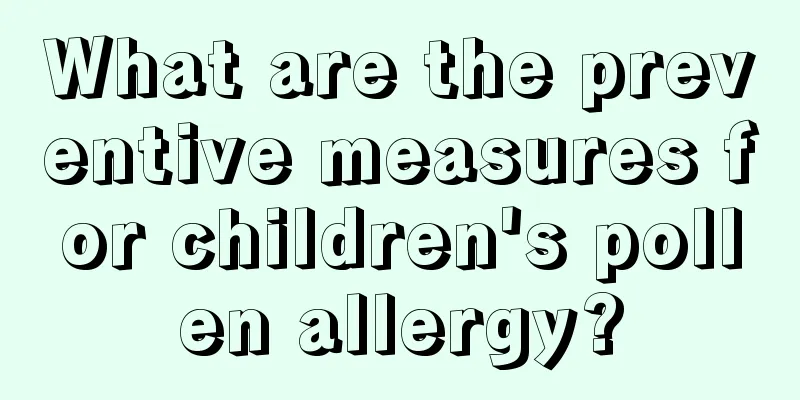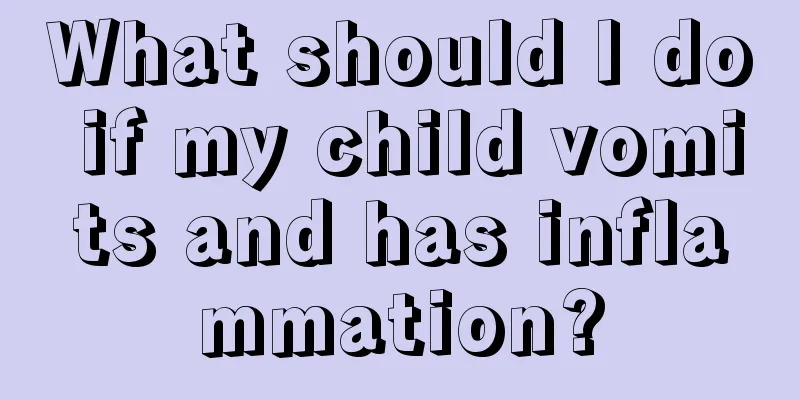What is the reason for the baby's high fever convulsions?

|
High fever and convulsions in babies are a disease that often occurs in babies, and it is also a disease that many parents are particularly worried about. When a baby has a high fever and convulsions, you must not worry too much, and do not do anything that is not good for the baby. In particular, many parents pinch the Ren Zhong point after the baby has a convulsion. This is abnormal. When the baby has a high fever and convulsions, we must deal with it correctly. Let’s understand the reasons for high fever and convulsions in babies. The causes of childhood convulsions can be divided into two categories: infectious (febrile convulsions) and non-infectious (afebrile convulsions) according to the presence or absence of infection. According to the site of involvement of the lesion, it is divided into intracranial and extracranial types. (1) Infectious convulsions (febrile convulsions) 1. Intracranial diseases and viral infections such as viral encephalitis and Japanese encephalitis. Bacterial infections such as purulent meningitis, tuberculous meningitis, brain abscess, and venous sinus thrombosis. Fungal infections such as cryptococcal meningitis. Parasitic infections such as cerebral cysticercosis, cerebral malaria, cerebral schistosomiasis, cerebral paragonimiasis, and toxoplasmosis. 2. Extracranial diseases include high fever convulsions, toxic encephalopathy (severe pneumonia, whooping cough, toxic dysentery, sepsis as primary diseases), tetanus, etc. (ii) Non-infectious convulsions (afebrile convulsions) 1. Intracranial diseases and craniocerebral injuries such as birth injuries, brain trauma, neonatal asphyxia, and intracranial hemorrhage. Abnormal brain development such as congenital hydrocephalus, cerebrovascular malformations, macrocephaly (microcephaly), cerebral palsy and neurocutaneous syndrome. Intracranial space-occupying diseases such as brain tumors and brain cysts. Epileptic syndromes such as grand mal seizures and infantile spasms. Brain degenerative diseases such as demyelinating encephalopathy and macular degeneration. 2. Extracranial diseases Metabolic diseases such as hypocalcemia, hypoglycemia, hypomagnesemia, hyponatremia, hypernatremia, vitamin B1 or B6 deficiency, etc. Genetic metabolic diseases such as glycogen storage disease, galactosemia, phenylketonuria, hepatolenticular degeneration, and mucopolysaccharidosis. Systemic diseases such as hypertensive encephalopathy, uremia, heart rhythm disorders, severe anemia, food, drug and pesticide poisoning, etc. The above introduction is about the causes of high fever convulsions in babies. When a baby has a high fever convulsion, we must first pay attention to the baby's clothes being loose, and then let the baby lie on his side. After the baby recovers to normal, be sure to go to the hospital for examination and treatment in time with the baby. Care for the baby during treatment is particularly important. |
<<: What can a seven-month-old child eat to cure his cough quickly?
>>: What to do if a 7-year-old child has a cold and fever
Recommend
How to deal with bacterial infection in children's cough
What to do if children cough frequently is a conc...
What diet should be provided for babies with diarrhea?
Every mother's heart is tied to her child. Wh...
Physiological changes in girls during development
We all know that the fastest period of human deve...
Reasons why babies suddenly stop feeding
There are many reasons why babies don't want ...
What should I do if my baby has lymph nodes on his neck?
As a newborn living being, babies have incomplete...
What causes frequent foot pain in children?
Children often experience foot pain, which is mos...
Baby's foot turns inward
The phenomenon of babies turning inward is very c...
Is it good for children to drink milk before bed?
Milk is a food with high nutritional value and is...
How can children grow taller?
Everyone hopes that their children can have a rel...
10 problems for newborns (jaundice, milk rash, spitting up, stuffy nose, hiccups, etc.)
1. Jaundice What is jaundice? There are two types...
The baby cannot lift his head for 100 days. Do you know why?
Babies can basically lift their heads when they a...
Why is my baby's urine dark red?
Having a baby at home can be said to be a very ha...
How to wash a newborn baby's butt
We usually take a bath regularly to maintain pers...
Why does a child have a fever in the upper body but a cold lower body?
Everyone knows the feeling of having a fever. You...
Why is the philtrum of a newborn baby blue?
The blue philtrum of a newborn may have both phys...









